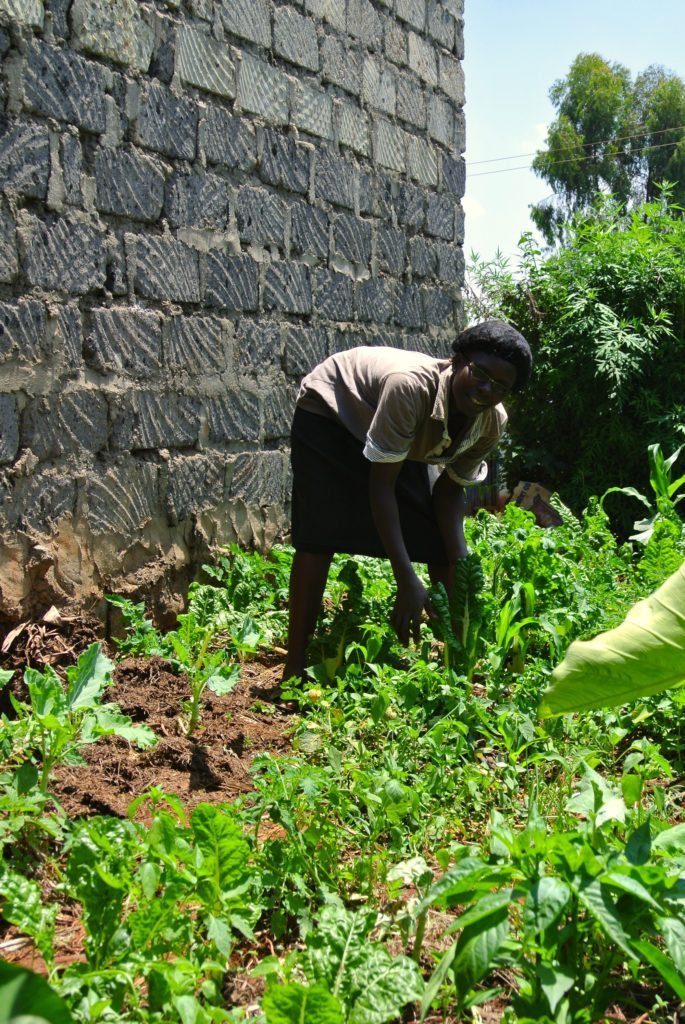
27 Sep Planting for Empowerment
Imagine that you are a working woman in rural Kenya. Your husband is either not around or not interested in working (or perhaps both).
You try to provide for you and your children by doing odd jobs, but you rarely have enough money to buy the food needed for well-balanced meals. You rent a small apartment that is surrounded by concrete. You would be a good candidate for Koinonia Baptist Church’s kitchen garden program.
The program in Kenya focuses on empowering the surrounding community by providing the knowledge and resources necessary for gardens to be planted and maintained. Those in the community who have no access to land are taught to plant vegetables in large sacks filled with soil and manure outside their front doors.
A pastor from Konionia instructs each gardener on the basics of planting and maintaining crops. The church gives instruction and some manpower for the project, but the weight of the planting and the continued maintenance is placed on the shoulders of the gardener. The willingness and effort put forth by the gardeners will ultimately determine the success of each garden.
Robert is working to pilot a new version of the kitchen garden right now. He discusses his plan, “In the original kitchen gardens, we used cloth sacks because the sacks are common and very accessible for people. However, I am piloting these new gardens in large metal cylinders. These will be easier to transfer in case the gardener moves and will last for multiple planting seasons.” Robert drills holes into the sides of the metal cylinders so that both the sides and the top of the soil can be utilized. For now, these portable kitchen gardens feature spinach, onions, and kale, but Robert hopes to test some other crops in them as well.
Space for a garden is not always an issue for those who rent. For some, they simply lack the knowledge to grow successful gardens. Irene was one of those individuals. Irene’s husband spends most of his time drinking instead of working to provide for his family. Irene tried to plant a garden herself in the past, but she made a few key mistakes that kept her from yielding a plentiful harvest.
A few from the church staff came by one afternoon and explained to Irene the concepts of plowing, spacing, fertilizing, and mulching. They worked with her on a small section of her land. The next week when they returned to her home, she had already expanded her garden to twice its original size!
Today, Irene grows more than enough vegetables to provide for her family. She sells the rest of her crops to her neighbors at her vegetable stand. Her garden has grown from simple provision for her own family to a business in itself.
As we spoke with Irene about her garden, several other women from the neighborhood stood by and observed. They have seen the positive results that Irene is reaping from her garden, and they want to be able to do the same for themselves. Robert is hopeful that the next step of growth for the kitchen garden program will be a community-wide class and demonstration.
Over the years, Grace Church has helped to provide resources in support of this program. As leaders in Kenya pursue holistic community empowerment, they can use initiatives such as kitchen gardens in coordination with OVC to help eliminate the multi-faceted issues that many Kenyans face.
Potentially vulnerable families may not earn sufficient wages each day to cover costs for both food and the other basic needs of their children. However, as parents gain the knowledge needed to grow their own food for their families, they can use their finances to purchase clothing and to pay school fees and monthly rent. When their children are also part of the OVC program, they receive further support and development through the monthly gifts of advocates. The futures of these children are being directly impacted by these programs as more opportunities for growth and development become available to each.
Click here for more information regarding our partnership in Kenya and the OVC Kenya program.



